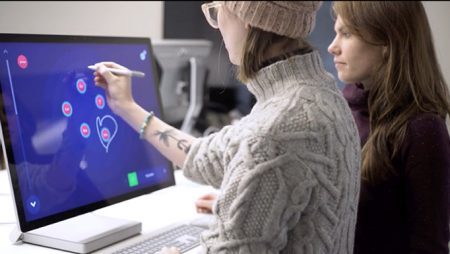Researchers at Northwestern University and the Oxford Internet Institute, University of Oxford, are proud to announce the stable release of the Network Canvas suite of tools for collecting social network data. The three Network Canvas applications present a user-friendly experience for designing, deploying, and managing data from social network interviews in a variety of settings from classrooms to contact tracing.
Over four years in development and funded by the U.S. National Institutes of Health (Grant R01DA0422711), Network Canvas marks a new era in the design and collection of social network data. Built atop some of the latest technologies in software development, Network Canvas is available on Windows, Mac, Linux, iOS, and Chrome and is completely free to use. Where social network surveys have often been considered dull, invasive, or overly complicated, peer reviewed studies based on early builds have demonstrated that this software is considered fun and highly usable by participants in a variety of settings.
Co-Investigator Dr Bernie Hogan, Senior Research Fellow, Oxford Internet Institute said:
“Collecting data about people’s relationships to others is a delicate but important part of many scientific fields from studies of community to contact tracing for COVID. Network Canvas has been designed to help respondents feel more comfortable with this process. It’s been a long journey for me from collecting network diagrams with pen and paper to being a part of a team that has produced a fully-fledged software equivalent. I’m blown away with the results.”
Network Canvas marks a shift in academic data collection of networks away from the collection of online trace data from sites like Facebook and Twitter towards more scalable ways to collect self-reported data.
Added Hogan, “many of the most consequential relationships, from sexual contact to drug use to subjective feelings about peers in an office or classroom, are not easily collected online. But that does not mean they should stay low tech”.
From the outset, Network Canvas has been designed to bridge the gap between complex coding needs and those interested in more qualitative work: The first app, Architect, provides a visual walkthrough of how to develop social network-based interviews. The second app, Interviewer, provides a friendly and lean touchscreen interface for participants to use. The third app, Server, allows researchers to manage their data in a single place remotely with virtually no configuration. This ensures the data always stays on a researcher’s machines and is available for further analysis.
Lead developer and Oxford Internet Institute alumni Joshua Melville said:
“Understanding social contexts and relationships are central to so many research questions that we wanted to lower the barrier to entry for answering these questions. For us it was important to help researchers with network data whether they were seeking to enhance qualitative discussions with visual elements or scale up quantitative studies requiring consistency across many interviewers and sites”.
Collaboration, community engagement, and widespread uptake are central aims of Network Canvas, which is why the software suite is entirely open-source and accessible to all. By continuously incorporating feedback from the field and developing training materials to support new users, Network Canvas has also lowered some of the barriers to engaging in cutting-edge network science research.
Co-Principal Investigator Michelle Birkett, Assistant Professor at Northwestern added:
“We wanted to build a tool that the entire social network community could utilize and feel a part of. The open-source nature of the work means that anyone can see what we’ve done, add to it, and change things to fit their own specifications that could potentially be rolled back into the software,” said Birkett.
Four years in the making, Network Canvas was previously available to the public during a beta period for testing and feedback beginning in 2019. During this time, beta testers provided feedback, bug reports, and feature requests, directly informing the development of the tool. Early-access researchers have already used Network Canvas to investigate in-depth supplements to contact tracing, to understand the connection between risky sex and drug use, to understand social cohesion in deprived communities, and to understand classroom dynamics among graduate students. This iterative road of development has culminated in the production of a tool which has the potential to increase access to and transform social networks research across disciplines.
The stable versions of all three apps within the Network Canvas Suite are available now for widespread use.
Notes for editors:
About Network Canvas
Network Canvas is a free and open-source set of software for surveying personal networks, designed around the needs of both researchers and participants. Visit https://networkcanvas.com/ to learn more.


